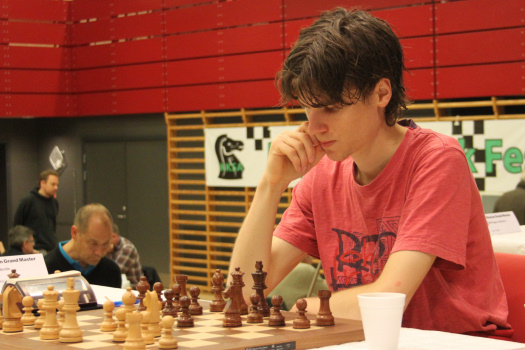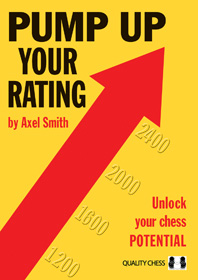|
|
2013-10-21GM-norm and Nordic Champion!

I won the first three games after the book was published, but even more important, I really enjoyed playing.
So when I saw that my schedule was almost empty for a week, I postponed the game in the club tournament in Lund and registred for the Nordic Championship.
I think the late decision was good for two reasons:
1) Before the Swedish Championship, I studied chess for five hours per day in a month.
Even though I had no explicit goal, it gives some pressure to performe well. This time, I only solved a few exercises.
Less expectations made it easier to play fast - I had no pressure to play at top.
2) It was the last chance to play for a while. "Last chance" is rocket fule for motivation - which is the basis for good concentration.
(Just think about how often we try to convince ourselves that we have a "last chance". I managed this time.)
So - a spontanous decision before a little pause gave me motivation without expectation. It's an explanation, but of course no prescription.
It's not possible to order a spontanous decision at a certain moment!
I have missed the GM-norm in a decisive game six times before. It's hard to describe how I feel now; it is as if everything has become less important
and much more important at the same time. Whatever I think of, I start smiling.
During the tournament, I went slacklining with Daniel Semcesen, who came three elopoints closer to the GM-title. Eight to go.
I also read a lot of novels about chess players. Why do they always turn over their king when they resign?
I have never seen anyone doing that - until today, when I played the post-poned game.
Finally, it's no doubt that you need some luck to perform over your abilities. If I hadn't won the ending in round one with a practical bluff, it would have been a different story.
But you also create your luck. The endgame, with short annotations, can be played over here. It actually reminds me of one of the games in chapter nine.
2013-10-21GM-norm and Nordic Champion!

I won the first three games after the book was published, but even more important, I really enjoyed playing.
So when I saw that my schedule was almost empty for a week, I postponed the game in the club tournament in Lund and registred for the Nordic Championship.
I think the late decision was good for two reasons:
1) Before the Swedish Championship, I studied chess for five hours per day in a month.
Even though I had no explicit goal, it gives some pressure to performe well. This time, I only solved a few exercises.
Less expectations made it easier to play fast - I had no pressure to play at top.
2) It was the last chance to play for a while. "Last chance" is rocket fule for motivation - which is the basis for good concentration.
(Just think about how often we try to convince ourselves that we have a "last chance". I managed this time.)
So - a spontanous decision before a little pause gave me motivation without expectation. It's an explanation, but of course no prescription.
It's not possible to order a spontanous decision at a certain moment!
I have missed the GM-norm in a decisive game six times before. It's hard to describe how I feel now; it is as if everything has become less important
and much more important at the same time. Whatever I think of, I start smiling.
During the tournament, I went slacklining with Daniel Semcesen, who came three elopoints closer to the GM-title. Eight to go.
I also read a lot of novels about chess players. Why do they always turn over their king when they resign?
I have never seen anyone doing that - until today, when I played the post-poned game.
Finally, it's no doubt that you need some luck to perform over your abilities. If I hadn't won the ending in round one with a practical bluff, it would have been a different story.
But you also create your luck. The endgame, with short annotations, can be played over here. It actually reminds me of one of the games in chapter nine.
Congratulations to Mikkel Jørgensen, who won a copy of the book by increasing his elo most after eight rounds!
This post came maybe a bit off the topic for this blog - the book - I can't help that I am a bit exited.
But I am also very happy about the feedback the book have got so far.
This post came maybe a bit off the topic for this blog - the book - I can't help that I am a bit exited.
But I am also very happy about the feedback the book have got so far.
|

 |
PUMP UP YOUR RATING
Any man in the street knows how to increase his physical strength, but among most chess players confusion reigns when it comes to improving their playing strength. Axel Smith's training methods have guided his friends, teammates and pupils to grandmaster norms and titles. Hard work will be required, but Axel Smith knows how you can Pump Up Your Rating.
Every area of chess is covered - opening preparation, through middlegame play, to endgame technique. Smith delves into both the technical and psychological sides of chess, and shows how best to practise and improve.
International Master Axel Smith from Sweden has had great success as a coach. Using his methods on himself, in the space of two years he boosted his rating from 2093 to 2458. He is now closing in on the Grandmaster title
ISBN: 978-1-907982-73-6 - Released September 2013
|
|
| |








